|
 Secure Site
Secure Site
|
 |
Archive for April, 2012
 The Zen Alarm Clock transforms mornings, awakening you gradually with a series of gentle acoustic chimes Once you use a Zen Clock nothing else will do Anyone who’s ever experienced a fitful night of sleep knows that “just relax” is easier said than done. But do-it-yourself meditation practices may help you prepare for rest, and put worries or discomfort behind you.
These techniques work best when done right before bed, in a quiet, calming environment. But you can also practice them several times a day, recommends Joyce Walsleben, PhD, associate professor at New York University School of Medicine.
“If you can keep your stress levels under control during the day, you’ll sleep better at night,” Walsleben says. “You can even do them at your desk or on the train.”
Abdominal breathing
Breathing from the abdomen and putting your attention on those breaths can help you relax both during the day and in bed at night. Some people may enjoy lying in a dimly lit room, closing their eyes, or listening to soft music while focusing on their out breaths.
While sitting or lying in bed, try placing your hands on your belly. “When you breathe in and breathe out, your hands may gently move,” says Kathy Doner, MD, who has a full-time hypnotherapy practice in Sebastian, Fla. “Focusing on this movement gets your mind off of your busy thoughts and onto your body. You can distract yourself and bring yourself to a different place. It’s very calming.”
Guided imagery
Some people imagine a calm scene to help them wind down at the end of the day. There are no rules about what you should imagine, so long as it’s calming. Although clouds, the ocean, and mountains are common choices, you can focus on something as general or as specific as you want.
“I had a patient who liked to picture his office—brushing everything off his desk and going to sleep,” Walsleben says. “Other people enjoy visualizing that they’re blowing bubbles. They put the stick in the jar and watch every bubble go over a field until the jar is empty.”
Pick a place that feels safe, and, using your imagination, invite any or all of your senses to explore it. “The brain doesn’t always know the difference between pretend and real,” says Dr. Doner. “If you watch a scary movie, your adrenaline might go up, just as if you imagine eating something vividly enough, you might start to salivate.”
Guided imagery can be done alone or with a specialist, such as a sleep doctor, cognitive-behavioral therapist, or hypnotherapist, or by using a tape or CD—but even when prompted by an instructor, the patient should still be the guide. “They need to imagine someplace comfortable and peaceful,” says Dr. Doner. “I don’t know where they need to go; the ocean may seem peaceful for one person, but traumatic for another.”
 Waking up in the morning should be as pleasant as falling asleep at night. The Zen Alarm Clock's gradual, gentle awakening is transformative. Mindful meditation
Focusing on different aspects of your life before bed can help you earn your rest, if you’re able to let those thoughts go. “You need to look at one thing at a time, which slows things down,” says Walsleben. “Focus on an issue in your life, then let it go. The major learning experience here is letting go.”
For some people, it may help to write in a journal during the day. “For 15 minutes take those issues that run through your head at night and write them down,” says Walsleben. “Then for the next 15 minutes make a plan and write that down too. At night when the lights are off, you can’t do anything about it, but by processing things in the daytime, you can.”
Counting down
While lying in bed, start by gazing upward. “A little eye strain relaxes you,” says Dr. Doner. Take an abdominal breath and hold it, and on the out breath, let everything relax. Repeat one or two times. You might then try imagining yourself walking down a flight of stairs or a gentle hill while counting down from 10 or 20, each number signifying your movement to a lower step, exhaling with each imaginary step.
You can also weave a number of these techniques together, Dr. Doner says. “You might start with your belly breath,” she says, “then go to progressive relaxation, then down the stairs, then go to your peaceful place. You want to give people a lot of things to try.”
One of the ultimate Zen like experiences is waking-up from a great slumber refreshed and energized. Your mind and body are harmoniously one, both alert and focused. Having a refreshed mind and body are two keys to a natural and Zen lifestyle. Waking up in the morning should not be a loud and abrupt awakening, but rather it should be a peaceful positive experience. The right natural alarm clock can transition your deep and tranquil sleep into a serene start to consciousness. Imagine a long-resonating Tibetan bell-like chime waking you up to a beautiful morning experience.
The right alarm clock can be the most beneficial investment for you. With our Now & Zen natural alarm clock you are awakened more gradually and thus more naturally. Now & Zen is focused on creating a naturalistic lifestyle, and our clocks are an example of our philosophy.
adapted fro Health.com
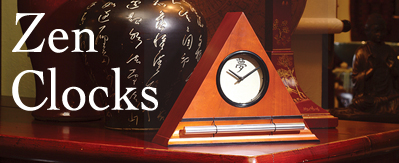 Wake up refreshed, love your alarm clock, transform your mornings with The Zen Alarm Clock's progressive awakening with gentle chimes. Now & Zen – The Meditation Timer Shop
1638 Pearl Street
Boulder, CO 80302
(800) 779-6383
orders@now-zen.com
Posted in Bamboo Chime Clocks
 Use our unique "Zen Clock" which functions as a Yoga Timer. It features a long-resonating acoustic chime that brings your meditation or yoga session to a gradual close, preserving the environment of stillness while also acting as an effective time signal. Following up on previous research showing that people who have practiced meditation for a long time have more gray matter in their brains, a small new study finds that their brains also shrink less as they age and they have stronger connections in the brain itself.
This means that brain cells may better relay electrical signals, researchers said.
“Our results suggest that long-term meditators have white-matter fibers that are either more numerous, more dense or more insulated throughout the brain,” study co-author Eileen Luders, a visiting assistant professor at the University of California Los Angeles Laboratory of Neuro Imaging, said in a university news release.
“We also found that the normal age-related decline of white-matter tissue is considerably reduced in active meditation practitioners,” she added.
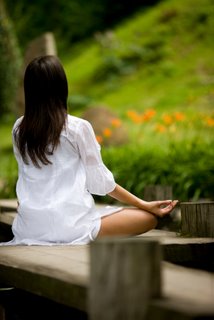 The beauty and functionality of the Zen Clock/Timer makes it a meditation tool that can actually help you "make time" for meditation in your life. Bring yourself back to balance. The researchers used technology known as diffusion tensor imaging to scan the brains of study participants and uncover differences in structural connectivity. The study included 27 people who practiced meditation styles such as Shamatha, Vipassana and Zazen for between 5 to 46 years, and 27 other people of the same age and gender who did not meditate.
The investigators found that the two groups had pronounced differences in structural connectivity throughout the brain, not just in one area.
“Meditation . . . might not only cause changes in brain anatomy by inducing growth, but also by preventing reduction,” Luders said. “That is, if practiced regularly and over years, meditation may slow down aging-related brain atrophy, perhaps by positively affecting the immune system.”
However, “it’s possible that meditators might have brains that are fundamentally different to begin with,” Luders pointed out.
“For example, a particular brain anatomy may have drawn an individual to meditation or helped maintain an ongoing practice — meaning that the enhanced fiber connectivity in meditators constitutes a predisposition towards meditation, rather than being the consequence of the practice,” Luders said.
The study findings were released online in advance of publication in the Aug. 15 print edition of the journal NeuroImage.
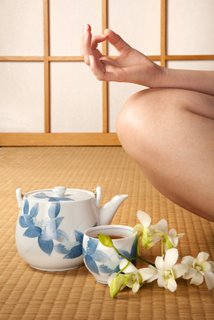 Use our unique "Zen Clock" which functions as a Yoga Timer. It features a long-resonating acoustic chime that brings your meditation or yoga session to a gradual close, preserving the environment of stillness while also acting as an effective time signal.
Although meditation can be done in almost any context, practitioners usually employ a quiet, tranquil space, a meditation cushion or bench, and some kind of timing device to time the meditation session. Ideally, the more these accoutrements can be integrated the better. Thus, it is conducive to a satisfying meditation practice to have a timer or clock that is tranquil and beautiful. Using a kitchen timer or beeper watch is less than ideal.
And it was with these considerations in mind that we designed our digital Zen Alarm Clock and practice timer. This unique “Zen Clock” features a long-resonating acoustic chime that brings the meditation session to a gradual close, preserving the environment of stillness while also acting as an effective time signal. The Digital Zen Clock can be programmed to chime at the end of the meditation session or periodically throughout the session as a kind of sonic yantra. The beauty and functionality of the Zen Clock/Timer makes it a meditation tool that can actually help you “make time” for meditation in your life.
More information
The U.S. National Center for Complementary and Alternative Medicine has more about meditation.
– Randy Dotinga
SOURCE: University of California, Los Angeles Health Sciences, news release, July 14, 2011
 Our Yoga Timer & Clock can be programmed to chime at the end of the meditation or yoga session or periodically throughout the session as a kind of sonic yantra. Now & Zen – The Meditation Timer Shop
1638 Pearl Street
Boulder, CO 80302
(800) 779-6383
orders@now-zen.com
Posted in Bamboo Chime Clocks
 Can an alarm clock be bad for your health? According to Research by the National Institute of Industrial Health in Japan, despite the popularity of using an alarm clock, waking up to a jolting noise can be bad for your heart. Waking up abruptly can cause higher blood pressure and heart rate. Besides increasing your blood pressure, an alarm can add to your stress levels by getting your adrenaline rushing.
The solution to this health-harming problem is to instead try gradually waking up to natural light or to The Zen Alarm Clock which has soothing chime sounds. It may not be simple, but this replacement method sounds better than shrills from your alarm clock.
One of the ultimate Zen like experiences is waking-up from a great slumber refreshed and energized. Your mind and body are harmoniously one, both alert and focused. Having a refreshed mind and body are two keys to a natural and Zen lifestyle. Waking up in the morning should not be a loud and abrupt awakening, but rather it should be a peaceful positive experience. The right natural alarm clock can transition your deep and tranquil sleep into a serene start to consciousness. Imagine a long-resonating Tibetan bell-like chime waking you up to a beautiful morning experience.
The right alarm clock can be the most beneficial investment for you. With our Now & Zen natural alarm clock you are awakened more gradually and thus more naturally. Now & Zen is focused on creating a naturalistic lifestyle, and our clocks are an example of our philosophy.
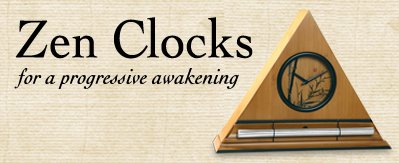 The Zen Alarm Clock transforms mornings, awakening you gradually with a series of gentle acoustic chimes Once you use a Zen Clock nothing else will do Now & Zen – The Soothing Alarm Clock Store
 The Calming Alarm Clock Store - Boulder, CO 1638 Pearl Street
Boulder, CO 80302
(800) 779-6383
orders@now-zen.com
Posted in Bamboo Chime Clocks, sleep, Sleep Habits
 Being Kept Awake - What to Do? Ukiyoe Hokusai It’s annoying enough to be kept awake by a music-blaring neighbor, but when it’s you who is sabotaging your own opportunity for rest, it really makes a girl want to scream…and cry from exhaustion.
Stress-induced insomnia is rampant these days among 20- and 30-something women. Thanks to job and money craziness, hectic social schedules, and the pressure to be totally together, the typical chick is more tense than ever, and that means she’s getting less sleep than her body needs, explains Joyce Walsleben, PhD, associate professor of medicine at the New York University School of Medicine and coauthor of A Woman’s Guide to Sleep.
Here, we explain how stress messes with your nocturnal schedule. Plus, we give tips to help you quiet your reeling brain and racing heart so you can get the R & R you need.
How Chronic Stress Screws Up Your System
It should be simple: You are tired and it’s bedtime, so you drift away within minutes of putting head to pillow. But when you’re stressed, things go haywire, and the exact opposite happens instead. Being even a little anxious can make your muscles tense, prompt your body to release the stress hormones cortisol and adrenaline, and elevate your heart rate.
You can feel these effects when you’re worried during the day. But at night, they have a stronger impact, overriding your ability to sleep or preventing you from staying asleep so you wake in the middle of the night, says Thomas Roth, PhD, director of the sleep center at the Henry Ford Hospital, in Detroit. Even if you do manage to snooze, stress will make the rest you get more fitful. Plus, you’ll spend more time in the lighter stages of sleep rather than in deeper slow-wave and REM sleep, which leaves you vulnerable to waking in the middle of the night, explains Barry Krakow, MD, medical director of the Maimonides Sleep Arts and Sciences, in Albuquerque, New Mexico, and author of Sound Sleep, Sound Mind.
Why Women Have It Rougher
Hormonal shifts may make a woman more susceptible to anxiety during certain points in her cycle, such as during her preperiod week. But insomnia is also caused by the way so many chicks run their lives: cramming a ton of tasks and responsibilities into their schedules and not saying no to bosses, friends, and family members who ask them to take on more, says Walsleben.
When you’re juggling a zillion things all day, it’s almost impossible to chill out at night — especially since the time you’re waiting to fall asleep may be one of the only free moments during which you can contemplate your life. If you’re stressed, thoughts and worries will flood your mind, triggering physiological changes incompatible with drifting off.
 Wake up with gradual, beautiful acoustic chimes. The Zen Alarm Clock transforms your mornings and gets you started right, with a progressive awakening The Snowball Effect
If stress kept you up only once every so often, it wouldn’t be that big of a deal. Unfortunately, it’s the snowball effect that makes the stress-sleeplessness trap so pernicious. “It’s called psychophysiologic insomnia,” says Walsleben. “After worrying about how you got no sleep the night before, you get into bed early the next night, worried that it’ll happen again. But this panic produces brain activity that makes it even harder to sleep, and the cycle continues for days, even weeks.”
Besides leaving you tired and cranky, insomnia also decreases your immunity, makes you forgetful, and can even lower your metabolism so you pack on pounds. It’s a health issue that affects your entire body, Walsleben adds. Beating the Stress/No-Sleep Cycle
Getting a handle on this kind of insomnia means learning how to reduce your stress levels during the day and keeping yourself from wigging out at night. These anxiety reducers will help.
Unplug yourself. Always being hooked up to your cell and social- networking sites boosts anxiety because you’re constantly anticipating the next call, text, or message. “Turning off your gadgets for an hour or two before you hit the sheets gives your brain time to turn off as well,” explains Allen Elkin, PhD, director of the Stress Management and Counseling Center, in New York City, and author ofStress Management for Dummies.
Take a nap. It sounds counterproductive, but a 30-minute nap will lower levels of cortisol, so you’ll wake up feeling less anxious. Try to nap before 2 p.m., when it’s less likely to cut into your regular sleep hours.
Write a been-done list. Instead of a to-do list, jot down everything you’ve accomplished at the end of the day, even small tasks. Seeing the list in writing will remind you that your life is less frazzled and out of control than you think it is, and that’ll help you chill.
Set a daytime worry slot. Late in the afternoon, take 20 minutes to think about only whatever it is that’s making you nervous at the moment. “Worries are never as bad in the day as they are at night, so you’re more likely to put things in perspective and come up with a plan of action,” says Walsleben.
Sink into sleep. While you’re lying there, obsessing over whether sleep will ever come, ease your nervous system with this trick: Imagine the muscles in your feet relaxing and melting into your mattress. Picture the same scenario with your calves, then your thighs, until you have worked your way up your entire body. In addition to relaxing your muscles, it’s a visualization tactic that calms your brain as well.
Take advantage of being up at night. Instead of freaking out about how tired you are going to be in the morning, treat your being awake at 2 a.m. as a lucky break, giving you time to enjoy soothing activities like reading. By viewing insomnia as a positive thing, you’ll have nothing to stress about, and paradoxically, you will likely have trouble keeping your eyes open much longer.Sleep Tricks
Below, little tactics that bring on the zzz’s and some that backfire.
What Works
Taking a hot bath before bed. Besides being relaxing in its own right, the steamy water also raises your core body temperature, and the subsequent drop in body temperature after you leave the tub puts you in hibernation mode.
Sipping a cup of warm milk. The warmth is comforting, but it’s really the milk that has a soporific effect. Milk contains tryptophan, an amino acid that is converted into serotonin — a body chemical in the brain that makes you drowsy.
Playing quiet, soothing music. Folk, classical, and even lite-FM tunes that maintain a steady pitch and rhythm have a lulling effect on your system.
What’s Bunk
Exercising close to bedtime. Working out prompts the release of adrenaline and endorphins, hormones that keep you awake. Better to hit the gym at least three to four hours before you go to sleep so you give your body time to cool down and the hormone rush time to subside.
Having a drink. Alcohol can make you sleepy initially, but it will likely wake you up later as your body metabolizes the booze.
Snacking late at night. It varies depending on the type of food, but in most cases, eating will just pep you up. Even a rich, heavy snack that leaves you feeling woozy at first may cause you to wake in the middle of the night as your body digests the fat.
Wake up refreshed, love your alarm clock, transform your mornings with The Zen Alarm Clock’s progressive awakening with gentle chimes.
Boulder, Colorado—an innovative company has taken one of life’s most unpleasant experiences (being startled awake by your alarm clock early Monday morning), and transformed it into something to actually look forward to. “The Zen Alarm Clock,” uses soothing acoustic chimes that awaken users gently and gradually, making waking up a real pleasure.
Rather than an artificial recorded sound played through a speaker, the Zen Clock features an alloy chime bar similar to a wind chime. When the clock’s alarm is triggered, its chime produces a long-resonating, beautiful acoustic tone reminiscent of a temple gong. Then, as the ring tone gradually fades away, the clock remains silent until it automatically strikes again three minutes later. The frequency of the chime strikes gradually increase over ten-minutes, eventually striking every five seconds, so they are guaranteed to wake up even the heaviest sleeper. This gentle, ten-minute “progressive awakening” leaves users feeling less groggy, and even helps with dream recall.
Source: Registered nurse Joyce Walsleben, PhD
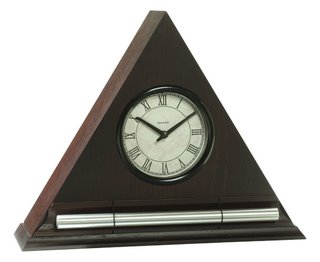 Progressive Chime Awakening - Choose the Most Natural Way to Wake Up Now & Zen – ‘The Most Natural Way to Wake Up’ Clock Shop
1638 Pearl Street
Boulder, CO 80302
(800) 779-6383
orders@now-zen.com
Posted in Bamboo Chime Clocks, sleep, Sleep Habits, zen, Zen Alarm Clock
 It's exquisite sounds summon your consciousness out of your meditative state with a series of subtle gongs. Once you experience the Zen Timepiece's progressive tones, you'll never want to meditate any other way. People who routinely practice meditation may be better able to deal with pain because their brains are less focused on anticipating pain, a new British study suggests.
The finding is a potential boon to the estimated 40 percent of people who are unable to adequately manage their chronic pain. It is based on an analysis involving people who practice a variety of meditation formats, and experience with meditation as a whole ranged from just a few months to several decades.
Only those individuals who had engaged in a long-term commitment to meditation were found to have gained an advantage with respect to pain relative to non-meditators.
“Meditation is becoming increasingly popular as a way to treat chronic illness such as the pain caused by arthritis,” study author Dr. Christopher Brown, from the University of Manchester’s School of Translational Medicine, said in a university news release.
“Recently,” he noted, “a mental health charity called for meditation to be routinely available on the NHS [National Health Service of Great Britain] to treat depression, which occurs in up to 50 percent of people with chronic pain. However, scientists have only just started to look into how meditation might reduce the emotional impact of pain.”
The findings were released online recently in advance of publication in an upcoming print issue of the journal Pain.
All the forms of meditation that Brown looked at included mindfulness meditation practices, which form the basis of mindfulness-based cognitive therapy, which has been recommended for recurrent depression since 2004.
By using a laser to induce pain, Brown and his team found that activity in certain parts of the brain seemed to dip when the study participants anticipated pain. With that observation he was able to establish that those with upwards of 35 years of meditation under their belt anticipated pain the least.
In particular, meditators also seemed to display unusual activity in the prefrontal cortex region of the brain that is known for regulating attention and thought processes when a person feels threatened.
“The results of the study confirm how we suspected meditation might affect the brain,” explained Brown. “Meditation trains the brain to be more present-focused and therefore to spend less time anticipating future negative events. This may be why meditation is effective at reducing the recurrence of depression, which makes chronic pain considerably worse.”
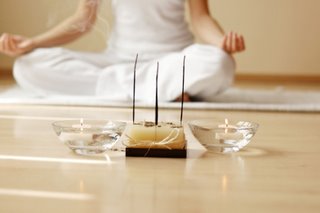 The Zen Timepiece can serve as a mindfulness bell in two ways: it can be set to strike on the hour (providing an hourly moment of stillness), or it can be set to strike at a programmed interval, such as every 20 minutes, or even every three hours. However, he added that “although we found that meditators anticipate pain less and find pain less unpleasant, it’s not clear precisely how meditation changes brain function over time to produce these effects.
Use our unique “Zen Clock” which functions as a Yoga & Meditation Timer. It features a long-resonating acoustic chime that brings your meditation or yoga session to a gradual close, preserving the environment of stillness while also acting as an effective time signal. Our Yoga Timer & Clock can be programmed to chime at the end of the meditation or yoga session or periodically throughout the session as a kind of sonic yantra. The beauty and functionality of the Zen Clock/Timer makes it a meditation tool that can actually help you “make time” for meditation in your life. Bring yourself back to balance.
More information
For more on meditation, visit the U.S. National Center for Complementary and Alternative Medicine. – Alan Mozes
SOURCE: University of Manchester, news release, June 2, 2010
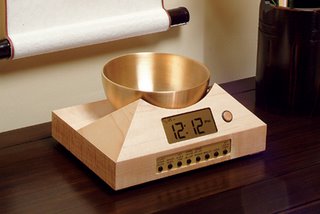 It serves as the perfect meditation timer. Now & Zen – The Meditation Timer Store
1638 Pearl Street
Boulder, CO 80302
(800) 779-6383
orders@now-zen.com
Posted in Bamboo Chime Clocks
 learning to pray Learning to Pray: A Beginner’s Guide
In her book “Beginner’s Grace: Bringing Prayer to Life,” Unitarian Universalist minister Kate Braestrup wrestles prayer out of the clouds. Here she answers our questions about how to start.
What Is Prayer to You?
Prayer is deliberate, intensive thought, offered silently or spoken aloud. It’s a tool that allows us to be more conscious, like meditation. I pray for two reasons. If I have an urgent desire for something, I’ll pray like crazy.
Prayer is likely to be our default mode for managing the fear and pain that sometimes come with human experience and for engaging the sacred dimensions of that experience. Because it’s set apart from the normal stream of life, and because it can be ritualized, prayer can give us comfort in crisis. It can also nudge us in the direction of awareness and a deeper empathy — which is to say, wholeness.
Why Do It?
There are so few opportunities in a modern life in which we are asked (or allowed!) to pause and pay attention to anything other than our own preoccupations. I can name a few — singing the national anthem before a ball game; saying the Pledge of Allegiance; singing the R-O-T-A-R-Y song at Rotary Club meetings.
But even then, our smartphones ping, we’re snapping pictures of Derek Jeter, who looks so cute with his cap held over his heart. Prayer is wildly countercultural, even subversive: Pause, bow your head, close your eyes, say a prayer? You rebel, you!
 prayer What If You Don’t Believe in G-O-D?
That’s okay. You don’t have to use someone else’s idea or language when you pray. My whole theology can be summed up in a three-word sentence: God is love.
But you don’t have to begin with theology. You don’t have to know why you are praying or to whom. You can just try it — literally pray every day for a week and see if this helps you to be more aware and more loving.
Incidentally, silent prayer is fine. As St. Francis of Assisi advised, “Pray without ceasing. If necessary, use words.” Or try Buddhist prayers, which don’t insist on addressing themselves to anyone but draw your mind toward attentive listening and compassionate response.
How Can We Begin?
Pray before meals. Say a simple prayer of thanks or just take a moment in silence. You don’t need to kneel on gravel. You don’t even need a lot of self-discipline. Since you eat every day, the meal is a built-in reminder.
Prayer demands no drama. Before you eat your next meal, pause. Close your eyes, bow your head. Let yourself be. You have everything required for prayer and need believe only in what is self-evident: You are a human being, alive now.
And then: Eat.
Whole Living, December 2010
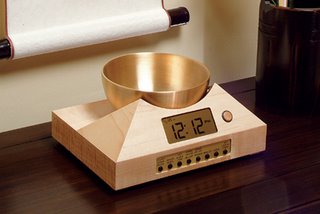 tools for prayer, timers and clocks Now & Zen’s Chime Timer Store
1638 Pearl Street
Boulder, CO 80302
(800) 779-6383
Posted in Bamboo Chime Clocks, Chime Alarm Clocks
 sleep inducing tea Natural Sleep Remedies:
Sleep-Inducing Tea
For a relaxing bedtime beverage, Yance suggests combining several herbs as follows: Passionflower and skullcap soothe agitated nervous systems and can help with mental chatter; oat seed strengthens the nervous system and helps people who are too tired to sleep; and chamomile provides a gently relaxing base.
1 chamomile tea bag
30 to 60 drops passionflower tincture
15 to 30 drops skullcap tincture
15 to 30 drops milky oat seed (Avena sativa) tincture
Pour boiling water over tea bag and let steep for five minutes. Remove tea bag, and add drops of tincture to tea. Stir in a touch of honey if desired. Sip and enjoy.
 Waking up in the morning should be as pleasant as falling asleep at night Waking up in the morning should be as pleasant as falling asleep at night. The Zen Alarm Clock’s gradual, gentle awakening is transformative.
Waking up in the morning should be as pleasant as falling asleep at night. The Zen Alarm Clock’s gradual, gentle awakening is transformative.
Now & Zen
1638 Pearl St.
Boulder, CO 80302
(800) 779-6383
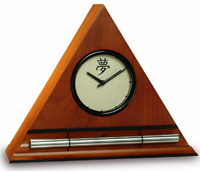 gentle awakening alarm clock with chime
Posted in Bamboo Chime Clocks, Chime Alarm Clocks
 be calm for your health High blood pressure is not something you’d expect to see in kids, but the incidence has risen dramatically in the last few years along with their obesity rates. And there’s plenty of reason to be alarmed, since the condition can lead to heart disease later in life.
Luckily, there’s an easy way to treat it that doesn’t involve nagging kids to get up and exercise (not that being active is a bad thing, of course). Meditation, a proven blood pressure-reducer for adults, turns out to be useful for hypertensive children as well.
In a recent study at a middle school in Augusta, Georgia, 73 11- and 12-year olds were randomly assigned to either a meditation group or a health class where they learned about exercise and nutrition. After three months, the meditators, who practiced for 20 minutes twice a day, saw a significant drop in their blood pressure. The other group got no such benefit.
“If they keep it up, the meditators could substantially reduce their risk of dying from heart disease or stroke,” says Vernon Barnes, coauthor of the study. Some kids also got relief from headaches and asthma attacks, he adds.
A safe, and free, solution to some serious health problems: What more could you ask for?
adapted from Natural Solutions Magazine
Our Zen Timepiece’s acoustic 6-inch brass bowl-gong timer & clock is the world’s ultimate alarm clock, practice timer, and “mindfulness bell.”
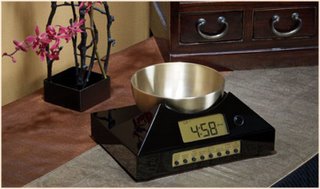 Zen Timepiece, a natural sounding timer with bowl/gong Now & Zen’s Clock and Meditation Timer Store
1638 Pearl Street
Boulder, CO 80302
(800) 779-6383
Posted in intention, Meditation Timers, Meditation Tools, Well-being, Zen Timers
 Meditation is generally an inwardly oriented, personal practice, which individuals do by themselves. Meditation may involve invoking or cultivating a feeling or internal state, such as compassion, or attending to a specific focal point. Meditation means different things to different people, and there are many ways to do it. This topic focuses on a kind of meditation called mindful meditation. This practice may help you relax and relieve stress.
Key points
- The goal of mindful meditation is to focus your attention on the things that are happening right now in the present moment. The idea is to note what you experience without trying to change it.
- Meditation can help you relax, because you are not worrying about what happened before or what may occur in the future.
- You don’t need any special tools or equipment to practice this meditation. You just sit in a comfortable position in a chair or on the floor. Or you can lie down, if that is more comfortable for you.
- If your mind wanders, don’t worry or judge yourself. When you become aware that your thoughts are wandering, simply focus again on the present moment. One way to do this is by paying attention to your body. For example, is your breathing fast or slow, deep or shallow?
Meditation may bring up certain feelings or emotions. If this happens, don’t try to rid your mind of these feelings. Just focus on what you feel at the present moment. Don’t get lost in the thoughts that those feelings might trigger.
adapted from Healthwire.com
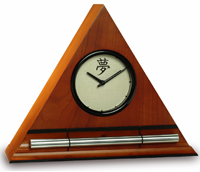 When you hear the sound of the mindfulness bell, you are invited to take a moment to breathe in and out and center yourself in the present. Now & Zen
The Meditation Timer Store
1638 Pearl Street
Boulder, CO 80302
(800) 779-6383
orders@now-zen.com
Posted in Bamboo Chime Clocks
 Use our unique "Zen Clock" which functions as a Yoga Timer. It features a long-resonating acoustic chime that brings your meditation or yoga session to a gradual close, preserving the environment of stillness while also acting as an effective time signal. Researchers say they’ve taken a significant stride forward in understanding how relaxation techniques such as meditation, prayer and yoga improve health: by changing patterns of gene activity that affect how the body responds tostress.
The changes were seen both in long-term practitioners and in newer recruits, the scientists said.
“It’s not all in your head,” said Dr. Herbert Benson, president emeritus of the Benson-Henry Institute for Mind/Body Medicine at Massachusetts General Hospital and an associate professor of medicine at Harvard Medical School. “What we have found is that when you evoke the relaxation response, the very genes that are turned on or off by stress are turned the other way. The mind can actively turn on and turn off genes. The mind is not separated from the body.”
One outside expert agreed.
“It’s sort of like reverse thinking: If you can wreak havoc on yourself with lifestyle choices, for example, [in a way that] causes expression of latent genetic manifestations in the negative, then the reverse should hold true,” said Dr. Gerry Leisman, director of the F.R. Carrick Institute for Clinical Ergonomics, Rehabilitation and Applied Neuroscience at Leeds Metropolitan University in the U.K.
“Biology is not entirely our destiny, so while there are things that give us risk factors, there’s a lot of ‘wiggle’ in this,” added Leisman, who is also a professor at the University of Haifa in Israel. “This paper is pointing that there is a technique that allows us to play with the wiggle.”
Benson, a pioneer in the field of mind-body medicine, is co-senior author of the new study, which is published in the journal PLoS One.
Benson first described the relaxation response 35 years ago. Mind-body approaches that elicit the response include meditation, repetitive prayer, yoga, tai chi, breathing exercises, progressive muscle relaxation, biofeedback, guided imagery and Qi Gong.
“Previously, we had noted that there were scores of diseases that could be treated by eliciting the relaxation response—everything from different kinds of pain, infertility, rheumatoid arthritis, insomnia,” Benson said.
He believes that this study is the first comprehensive look at how mind states can affect gene expression. It also focuses on gene activity in healthy individuals.
Benson and his colleagues compared gene-expression patterns in 19 long-term practitioners, 19 healthy controls and 20 newcomers who underwent eight weeks of relaxation-response training.
More than 2,200 genes were activated differently in the long-time practitioners relative to the controls and 1,561 genes in the short-timers compared to the long-time practitioners. Some 433 of the differently activated genes were shared among short-term and long-term practitioners.
Further genetic analysis revealed changes in cellular metabolism, response to oxidative stress and other processes in both short- and long-term practitioners. All of these processes may contribute to cellular damage stemming from chronic stress.
Another expert had a mixed response to the findings.
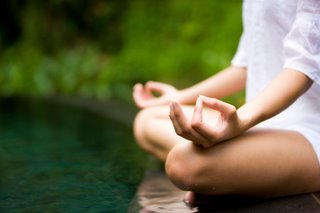 The beauty and functionality of the Zen Clock/Timer makes it a meditation tool that can actually help you "make time" for meditation in your life. Robert Schwartz, director of the Texas A&M Health Science Center’s Institute of Biosciences and Technology in Houston, noted that the study was relatively small. He also wished that there had been more data on the levels of stress hormones within the control group, for comparison purposes.
However, Schwartz called the study “unique and very exciting. It demonstrates that all these techniques of relaxation response have a biofeedback mechanism that alters gene expression.”
He pointed out that the researchers looked at blood cells, which consist largely of immune cells. “You’re getting the response most probably in the immune cell population,” Schwartz said.
“We all are under stress and have many manifestations of that stress,” Benson added. “To adequately protect ourselves against stress, we should use an approach and a technique that we believe evokes the relaxation response 20 minutes, once a day.”
Our Yoga Timer & Clock can be programmed to chime at the end of the meditation or yoga session or periodically throughout the session as a kind of sonic yantra. The beauty and functionality of the Zen Clock/Timer makes it a meditation tool that can actually help you “make time” for meditation in your life. Bring yourself back to balance.
More information
There’s more on meditation at the U.S. National Center for Complementary and Alternative Medicine.
By Amanda Gardner
HealthDay Reporter
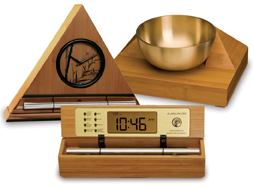 Bring yourself back to balance. Now & Zen – The Meditation Timer Store
1638 Pearl Street
Boulder, CO 80302
(800) 779-6383
orders@now-zen.com
Posted in Bamboo Chime Clocks
« Previous Page — « Previous Entries
Next Entries » — Next Page »
|
|
|
|